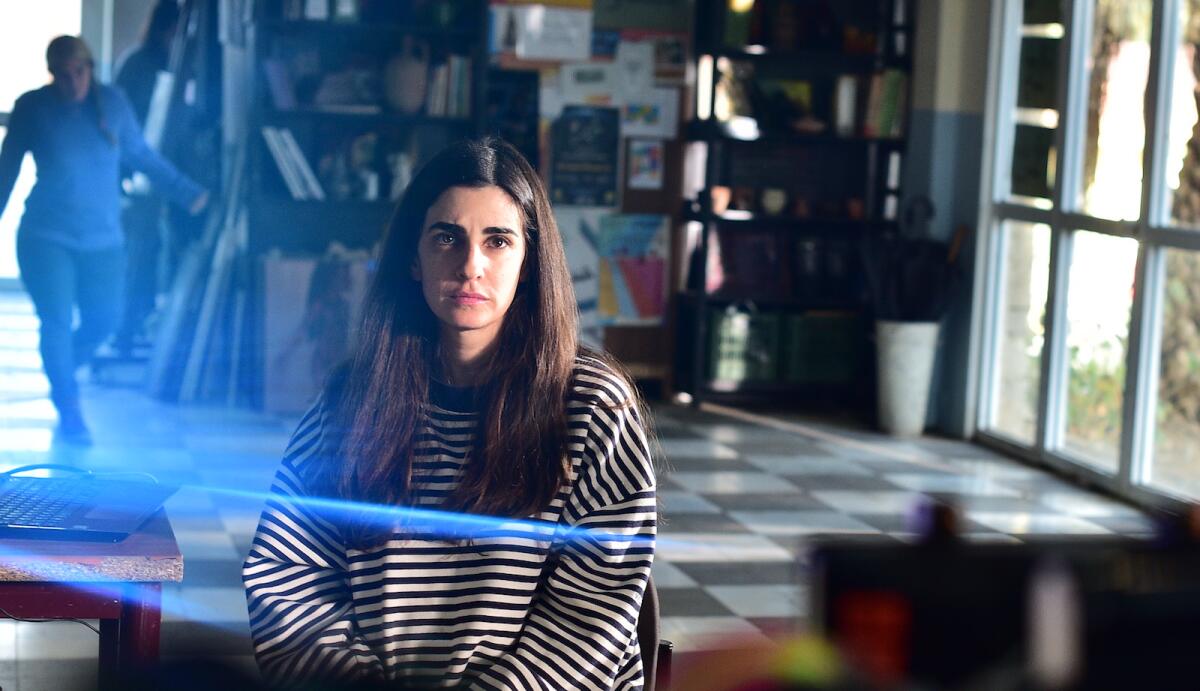Review: ‘Cinema Sabaya’ deftly captures exchanges of art, storytelling and empowerment

The old classroom concept of show-and-tell becomes a richer, deeper exercise for a workshop of Arab and Jewish women in Israeli filmmaker Orit Fouks Rotem’s heartfelt feature debut “Cinema Sabaya.” Given cameras and encouraged to record their lives and give voice to their dreams by a young teacher/filmmaker named Rona (Dana Ivgy), the eight figures in Rotem’s scenario also get a lesson in compassion merely by sharing their footage and talking about it.
We, meanwhile, get a wonderfully unforced, lightly intimate experience existing in a dramatic arena between observational nonfiction and bare-bones theater’s nowhere-to-go focus. Had Israel’s submission to this year’s Oscars landed an international feature nomination, it might have made for a spiritual across-the-categories companion to best picture nominee “Women Talking.” (Instead, it lies with the ignored female-made features “Saint Omer,” “The Woman King” and “She Said.”)
For your safety
The Times is committed to reviewing theatrical film releases during the COVID-19 pandemic. Because moviegoing carries risks during this time, we remind readers to follow health and safety guidelines as outlined by the CDC and local health officials.
The film’s only location is an unassuming community center in mixed-population Hadera, but that’s just the physical, neutral setting. As we get to know these generations-spanning Israeli women and see what their cameras reveal, worlds open, and the reality of constraint in their lives becomes apparent. That duality is in the title (which is the name of the workshop): It’s pointed out early on that while “sabaya” in Arabic usually means “group of young women,” it’s also a term that can convey “prisoner of war.” (Islamic State notoriously called their sex captives “sabaya.”)
The women, though, defy easy categorization, save the sisterhood denominator that they all do good works for the municipality: legal advice, library service, social work, caregiving. Only their dreams, asked for by the teacher interview-style at the beginning, betray age and experience, from long-retired, 73-year-old grandmother Awatef (Marlene Bajali) — “What dream?” she quips — to edgy student poet/painter Nahed (Aseel Farhat), who believes she can do anything.
Tough, glamorous Palestinian lawyer Nasrin (a magnetic Amal Murkus) recalls her longing to sing, while cheerful upper-class Jewish mom Eti (Orit Samuel) always wanted to be a film star. Though Nasrin and Eti have the class’s first tense exchange — sparked by a comment exposing Eti’s privilege and prejudice about Muslims — they don’t let it deter the work of the class, or affect later, friendlier interactions when the exercises get more soul-bearing.
Marriage and family, and agency within them, are intertwined topics of sensitivity yielding more molecule shifts in the room. Yelena (Yulia Tagil), a Russian émigré, has left her husband, but is now cash-strapped and forced to live with her parents, while Gila (Ruth Landau) is in a happy marriage, only because she left an abusive first husband. And soft-spoken, hijab-sporting mother of six Souad (a quietly powerful Joanna Said), a reluctant participant, wants to learn how to drive, if only it didn’t anger her husband.
In one of the most touching scenes about art and understanding, Souad is asked to free-associate over simple, hypnotic footage she shot at home of water filling a pail. The exercise was supposed to include a written letter read aloud, but having to talk freezes her. So the others do, praising the artfulness of her eye, the life it suggests. They’re telling her the image says plenty already.
As creation and conversation allow the women to move past acknowledged differences — on divorce, sexuality, child-rearing, even which language should be spoken (mainly Hebrew, with Arabic dotted throughout) — and toward friendship, the teacher’s dream is bared too. It leads to the film’s last, refreshingly necessary, ethical conversation: When it comes to art, storytelling and empowerment, how does one reconcile the private and the public?
To some extent, Rotem’s affecting, engaging work — made with actors, but adapted from real stories of women encountered in similar workshops, combining the specific, the invented, and the universal — is one delicately rendered answer to that question. But it starts with keeping the conversations going, and the cameras rolling.
‘Cinema Sabaya’
In Hebrew and Arabic with English subtitles
Not rated
Running time: 1 hour, 32 minutes
Playing: Laemmle Royal, West Los Angeles
More to Read
Only good movies
Get the Indie Focus newsletter, Mark Olsen's weekly guide to the world of cinema.
You may occasionally receive promotional content from the Los Angeles Times.










